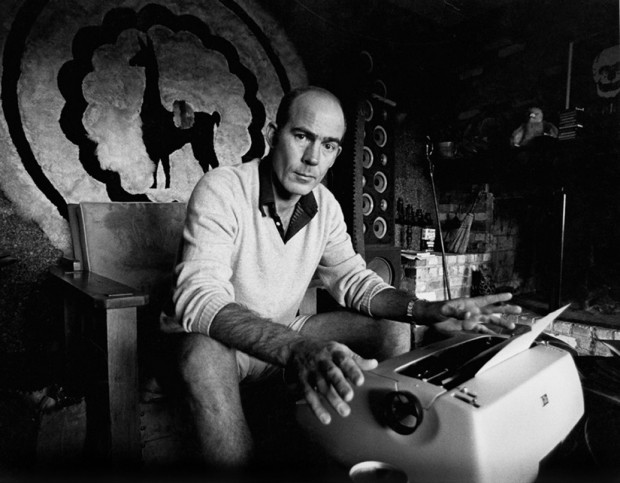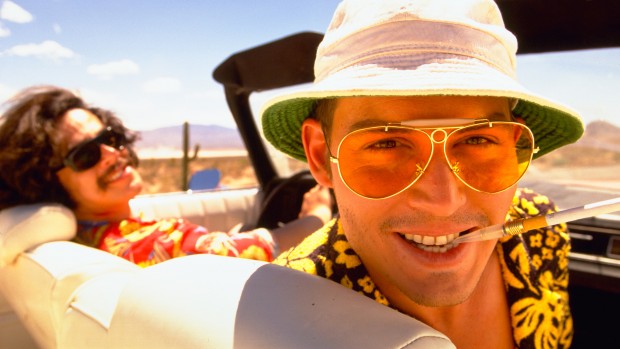Gonzo: the legacy of the Doctor of Journalism

One of the most influential American journalists and writers of the 20th century, Hunter S. Thompson
If Raoul Duke and yours truly (Rahul Duke?) share one similarity, it is that we have run away from journalism most of our lives. I used to consider journalism a mediocre, sucker-for-money, sensationalist, borderline sociopathic occupation. Now I am a journalist (Talk about becoming what you hate!). Being a film graduate, I considered writing novels, creating art and film my higher calling (though have found pleasure in journalism lately). Raoul Duke was the same. He considered writing books his calling. Duke was also the inventor of ‘Gonzo journalism’.
Dressed in madras shirts, khaki pants with a leather jacket, Chuck Taylors and his infamous yellow Aviators, possibly one of the strangely dressed man on earth, along with me perhaps (I chill in my jeans shorts, wrestling t-shirts or madras shirts, and wayfarers with blue temples so… yeah), Duke influenced journalism, art, film and literature for generations.
A continuous cycle of inspiration runs through the history of art. Artists get inspired by events, people, experiences and other artists as well. Duke aka. Hunter Stockton Thompson aka. The Doctor of Journalism (as the alter ego Duke liked to call himself) has been a personal influence on my writing style – a blend of literary and journalistic, non-fiction form, putting the writer in the center of the story as the protagonist.
That is the reason I struggled to write this article at first, being afraid of not doing justice to the ever-swearing, fast-talking, madras-wearing, Aviators-sporting, madman inventor of gonzo journalism. But what the hell? It was my idea to write about Hunter Thompson in the first place and yet, as much as I knew about his genius, having read his articles and experiences, my fingers trembled at the first word of the page. Not anymore, Duke. Not anymore.
As Thompson himself once said, “Buy the ticket. Take the ride.” I bought the ticket and I’m going to take the damn ride into the world of gonzo journalism.
Speaking of journalism, the man described the journalism industry in his famous book, Fear and Loathing in Las Vegas as: “The press is a gang of cruel faggots. Journalism is not a profession or a trade. It is a cheap catch-all for fuckoffs and misfits—a false doorway to the backside of life, a filthy piss-ridden little hole nailed off by the building inspector, but just deep enough for a wino to curl up from the sidewalk and masturbate like a chimp in a zoo-cage.”
But his international fame came from the same filthy piss-ridden hole, after the publication of his first book Hell’s Angels: The Strange and Terrible Saga of the Outlaw Motorcycle Gangs, a nonfiction book covering the highly feared motorcycle club Hell’s Angels, in 1967. As he became more popular as the counterculture icon and a solid journalist, his stance changed. He considered journalism “fun because it offers immediate work,” and because, hey “at least you can cover the fucking City Hall.”
He went on to be one of the most popular American writers of the previous century with books like Fear and Loathing in Las Vegas (which was eventually turned into a movie by Terry Gilliam in 1998, starring Johnny Depp), Fear and Loathing on the Campaign Trail ’72, The Rum Diary and The Great Shark Hunt.

A still shot from the 1998 film, ‘Fear and Loathing in Las Vegas’ by Terry Gilliam, in which Johnny Depp played Hunter S. Thompson’s alter ego, Raoul Duke.
In the back is Benicio Del Toro as Dr. Gonzo.
The film was based on Thompson’s book of the same name.
In June 1970, Thompson was to write a sports article for a short-lived ‘new journalism’ magazine Scanlan’s Monthly, covering the Kentucky Derby, an annual horse race during the two-week long Kentucky Derby Festival in Louisville, Kentucky, US. Facing the deadline and the lack of a clear story, he began to rip out the pages from his notebook and faxed it to his editor. The story, a result of non-stop partying and doing drugs for days amidst the drunken locals, was the birth of gonzo journalism. Thompson mainly focused on the drunkenness and degradation during coverage but concluded that, by the end, Ralph Steadman (his illustrator) and he had become the same people who they intended to satirize.
The first time the word ‘gonzo’ was used was by the editor at The Boston Globe magazine, Bill Cardoso who described Thompson’s article ‘Kentucky Derby is Decadent and Depraved’, as “pure gonzo journalism”. The word ‘gonzo’ coming from South Boston Irish slang which referred to the last man standing after an all-night drinking marathon. Being one of the forefathers of new journalism, Thompson came up with gonzo, bringing a more literary fiction style to journalism, describing an experience rather than mere statistics and facts. Written in first-person perspective, it makes the writing more subjective and participatory, combining social critique and satire. Utilizing sarcastic humor, exaggeration and profanity, a work of gonzo journalism does not even read like a traditional journalistic article, but more like a letter or a story by a friend, making it more entertaining and educating at the same time.
Writing, fueled with margaritas, drugs and a ton of nicotine in your body is always more exciting (for the writer as well as the reader) than writing when sober, itchy ass in your office chair, waiting for the clock to strike six and get the hell out. Thompson’s daily routine, as described by E. Jean Carroll in her pure gonzo-style biography of Hunter Thompson, named Hunter: The Strange and Savage Life of Hunter S. Thompson, mostly involved cocaine, Chivas, Heineken, and Dunhill, grapefruits, gin, orange juice, Chartreuse and grass with intervals every day.
Impressive, Hunter! Impressive! That would either kill me or transport my soul to some other dimension of Aviator-sporting, madras-wearing Hunter clones smoking a filter-fitted Dunhill with a shotgun in his hand, fast-talking, almost mumbling, “Holy shit, man! I can see my bald head reflected in your pupils!”
But hey, a man’s got to do what a man has got to do… to gain inspiration. Writing is a difficult profession… for a manic in search of an unknown higher purpose. A writer, specifically a journalist, has to hide the complete truth and still not lie. Thompson’s take on journalism and the idea of ‘truth’ was fascinating, to say the least.
He said, “So much for Objective Journalism. Don’t bother to look for it here–not under any byline of mine; or anyone else I can think of. With the possible exception of things like box scores, race results, and stock market tabulations, there is no such thing as Objective Journalism. The phrase itself is a pompous contradiction in terms.” And that “Absolute truth is a very rare and dangerous commodity in the context of professional journalism.”
Being a natural cynic, a borderline-nihilist Lebowski-esque person, I would agree to the absence of an absolute truth in everything we talk, write or do. There is a certain gonzo-ness in our life, an overwhelming, manic subjectivity that is obviously evident in our behavior, no matter how ‘objective’ or ‘truthful’ we may try to sound.
Thompson possibly showed the closest to a ‘true’ picture of the society we live in, in an unashamed way. His life was gonzo and even in his death, there was a certain mania and though, the disappointment of an aged man was present, he was not apologetic.
On February 20, 2005, Thompson shot himself in the head in his home, Owl Farm in Woody Creek, Colorado. With football season over and depression of old age catching up, there was no reason to live any longer.
His suicide note to his wife, later published by Rolling Stone, read: “No More Games. No More Bombs. No More Walking. No More Fun. No More Swimming. 67. That is 17 years past 50. 17 more than I needed or wanted. Boring. I am always bitchy. No Fun — for anybody. 67. You are getting Greedy. Act your (old) age. Relax — This won’t hurt.”
























































